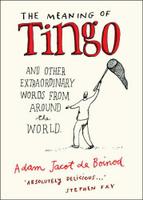- the meaning of tingo -
Due to the amount of interest all of a sudden in lyrical, and in some cases, provocative, words in Japanese, it has occurred to me opportune to continue in this momentum for a while longer before it wears off.
Luckily for me someone else has done all the research and all I have to do now is to transcribe it.
You've all heard that the Inuit people (eskimos) have 100 words for snow; and it is not difficult to conjecture why the spoken idioms in Hawaii have dozens of words for types of bananas and sugar cane.
But it must be a fairly common affair if "to swap wives for a few days only" can be summed up as areodjarekout in Inuit; or that the word aguna in Hebrew describes how a woman is "bound" and unable to remarry because, even though the husband has deserted her, he will not give her a bill of divorce, or because there is no certifiable evidence of his death.
If you intend to play a lute for a cow, be careful when you're saying it in Chinese, because it means "addressing to the wrong audience." And while we're on the topic of cows, you might also want to take note when addressing them, because they go um-mooo in Korea; hamba in Bengali; and in Mexican Nehotel they go choka.
Malay is a wonderful language. It is excellent for describing body motions and various types of odd postures, such as kengkang, which means "walking with legs wide apart"; kapai, which is "waving the arms to maintain a stable upright position"; or bongking, meaning "to lie on the floor with arms and legs spread and one's bottom in the air." It is a very concise language. My dear Malaysians, please justify. I can see Lin doing the kengkang as she is met with a fit of kapai followed by a relaxing bongking to end the day.
The onomatopoeic word bakbuk (bottle) in Hebrew gets a notable mention too cos it's cool.
And back to the lyrical side of things, the French have the word serein for thin rain falling from a cloudless sky.

The book "The Meaning of Tingo" (which means, in Easter Island Pascuense, to borrow objects from a friend's place, one by one, until there's nothing left) by Adam Jacot de Boinod, is out now. I'm going to get it.
The above have been compiled from here. Go read the article, it's funny. Thanks Nonie for that :)


2 Comments:
Okay, as a Malaysian, I did my uninvited duty to verify the words. As Lin has observed, I also only recognised two words right off the bat.
I decide to verify using the revered Kamus Dewan, the Malay equivalent of the Oxford dictionary.
kengkang - Yeap, "walk broadly" is spot on.
kapai - I didn't recognise this at first, then I recalled the word "mengapai" (the meng- prefix is equivalent to the -ing suffix in English). Which broadly means "waving arms in panic". Strangely, my memory is correctly verified with the Kamus Dewan.
bongking - I don't think there's a word in Malay that ends with 'ing'. The dictionary search also turned up nothing. I decided to change it to "bongkeng", which sounds more plausible.
bongkeng - And you know what it means, "to float on water proned (as in a corpse)."
ugh....
Post a Comment
<< Home